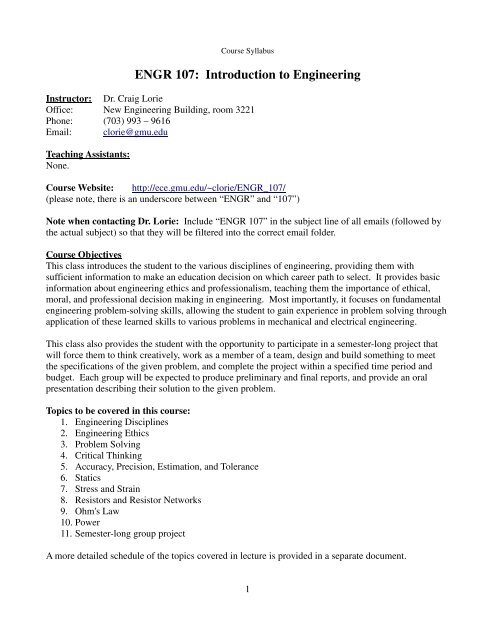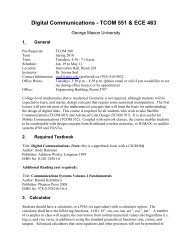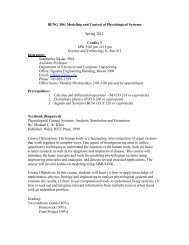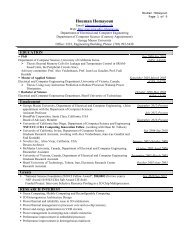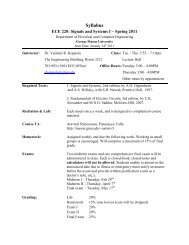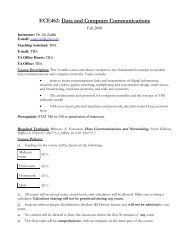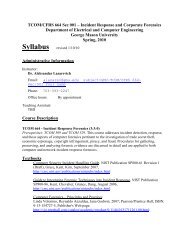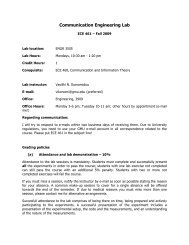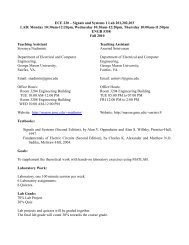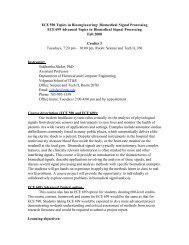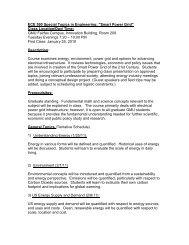Syllabus - ENGR107
Syllabus - ENGR107
Syllabus - ENGR107
You also want an ePaper? Increase the reach of your titles
YUMPU automatically turns print PDFs into web optimized ePapers that Google loves.
Course <strong>Syllabus</strong><br />
ENGR 107: Introduction to Engineering<br />
Instructor: Dr. Craig Lorie<br />
Office: New Engineering Building, room 3221<br />
Phone: (703) 993 – 9616<br />
Email: clorie@gmu.edu<br />
Teaching Assistants:<br />
None.<br />
Course Website: http://ece.gmu.edu/~clorie/ENGR_107/<br />
(please note, there is an underscore between “ENGR” and “107”)<br />
Note when contacting Dr. Lorie: Include “ENGR 107” in the subject line of all emails (followed by<br />
the actual subject) so that they will be filtered into the correct email folder.<br />
Course Objectives<br />
This class introduces the student to the various disciplines of engineering, providing them with<br />
sufficient information to make an education decision on which career path to select. It provides basic<br />
information about engineering ethics and professionalism, teaching them the importance of ethical,<br />
moral, and professional decision making in engineering. Most importantly, it focuses on fundamental<br />
engineering problem-solving skills, allowing the student to gain experience in problem solving through<br />
application of these learned skills to various problems in mechanical and electrical engineering.<br />
This class also provides the student with the opportunity to participate in a semester-long project that<br />
will force them to think creatively, work as a member of a team, design and build something to meet<br />
the specifications of the given problem, and complete the project within a specified time period and<br />
budget. Each group will be expected to produce preliminary and final reports, and provide an oral<br />
presentation describing their solution to the given problem.<br />
Topics to be covered in this course:<br />
1. Engineering Disciplines<br />
2. Engineering Ethics<br />
3. Problem Solving<br />
4. Critical Thinking<br />
5. Accuracy, Precision, Estimation, and Tolerance<br />
6. Statics<br />
7. Stress and Strain<br />
8. Resistors and Resistor Networks<br />
9. Ohm's Law<br />
10. Power<br />
11. Semester-long group project<br />
A more detailed schedule of the topics covered in lecture is provided in a separate document.<br />
1
Course <strong>Syllabus</strong><br />
Textbook<br />
Title: “Engineering Fundamentals and Problem Solving”, 5 th Edition<br />
Authors: Arvid Eide, Roland Jenison, Larry Northup, and Steven Mikelson<br />
Lecture<br />
Lecture Thursday 4:30 – 7:10 pm Dr. Craig Lorie<br />
Office Hours<br />
Dr. Craig Lorie Tuesday 1:00 – 2:00 pm<br />
Thursday 3:00 – 4:00 pm<br />
If you cannot attend the provided office hours, please feel free to contact me via email with questions<br />
that you have, or to schedule an alternate meeting time.<br />
The Design Project<br />
The design project will provide each student with the opportunity to gain practical experience in the<br />
engineering design process. This semester-long project will require teamwork, creative thinking, time<br />
management, and proper budgeting. It will require each team to complete the design and construction<br />
of a functional object that meets the given set of specifications. A detailed description of the project<br />
requirements will be provided in a separate document.<br />
Each team will be expected to produce two written documents, including a Preliminary Project Report<br />
and a Final Project Report, and an Oral Presentation. The grading rubrics for the reports and the oral<br />
presentation will be provided separately. In addition, each team will be expected to demonstrate their<br />
working design. The format of the demonstration is to be determined.<br />
All students should expect to spend considerable time outside of the classroom working on the project.<br />
Project Reports<br />
The requirements for the Preliminary and Final Project Reports will be provided separately.<br />
Oral Presentation<br />
Each team will give a 10 minute oral presentation about their project detailing the design choices,<br />
selected design, successes and failures of the design, and what could have been done differently. More<br />
detailed information will be provided separately.<br />
Please note, each student must participate in the oral presentation. The presentation should be<br />
organized such that each student presents for approximately two (2) minutes.<br />
2
Course <strong>Syllabus</strong><br />
Attendance<br />
Attendance in lecture is highly recommended. You are expected to be adults and, as such, make<br />
decisions that give you the best chances for success. The material covered in the lectures will<br />
supplement that which is covered in the textbook, provide additional examples to aid in the learning of<br />
the material, and, most importantly, offer you opportunities to ask questions to clarify the material.<br />
Thus, it will benefit you to attend lecture.<br />
You are responsible for all material covered in lecture.<br />
Homework<br />
Homework is assigned on a weekly basis, and is intended to reinforce the material covered in class.<br />
Each assignment will be posted along with its associated solution. You are expected to make an honest<br />
effort to complete the assignment prior to checking the solution. The only way you will learn the<br />
material properly is if you attempt the problems without the aid of the solution. Simply reviewing the<br />
solution will not help you understand how to solve the problem, nor will it foster the development of<br />
the engineering problem-solving skills taught in this class.<br />
Homework will not be graded.<br />
Writing Assignments<br />
Writing assignments are assigned periodically throughout the semester. Each has a specific purpose,<br />
and all are essential for the learning experience in this class. Each writing assignment must be<br />
submitted via email prior to the beginning of class on the day on which it is due.<br />
Late submissions will not be accepted.<br />
3
Course <strong>Syllabus</strong><br />
Exams<br />
There will be two (2) exams during the course of the semester, as well as a Final exam at the<br />
conclusion of the semester. All exams are closed book. You will, however, be allowed to use one side<br />
of an 8.5” x 11” sheet of paper on which to write your own notes. You may include anything you deem<br />
appropriate and/or useful except for previously worked out problems.<br />
Exams will be graded according to the following rubric:<br />
• 70% of points for the work<br />
◦ Initial equation with variables only<br />
◦ Initial equation with known values inserted<br />
◦ Show all steps; do not skip any<br />
◦ Do not use a value in an equation until it is defined<br />
• 20 % of points for correct solution<br />
◦ Tolerance: +/- 5%<br />
◦ Show three (3) significant digits<br />
◦ When a calculator is used, maintain all significant digits until the end; answers will be more<br />
accurate.<br />
◦ Partial credit will be awarded if the source of the error can be ascertained.<br />
• 10% of points for showing units<br />
◦ Units must be included with all numbers except those that are unitless<br />
◦ All or nothing basis.<br />
• Extra credit (if offered)<br />
◦ Correct – full value of problem added to exam score<br />
◦ Not attempted – no credit<br />
◦ Incorrect – half value of problem deducted from exam score<br />
Mechanics Exam: Thursday, October 8, 2009<br />
Electrical Theory Exam: Thursday, December 3, 2009<br />
Final Exam: Thursday, December 17, 2009, 4:30 – 7:15pm<br />
Grading<br />
Your final grade will be the weighted average of the scores you received on the writing assignments,<br />
the Mechanics and Electrical Theory exams, the Final exam, the Preliminary and Final Project Reports,<br />
and the Oral Presentation as calculate from the formula below:<br />
Writing Assignments 10%<br />
Mechanics Exam 10%<br />
Electrical Theory Exam 10%<br />
Preliminary Project Report 10%<br />
Final Project Report 25%<br />
Oral Presentation 10%<br />
Final Exam 25%<br />
4
Course <strong>Syllabus</strong><br />
Honor Code<br />
All rules of the GMU Honor Code system will be enforced.<br />
You must review the rules of the GMU Honor Code and be familiar with them.<br />
Honor code violations will be pursued and prosecuted to the fullest extent.<br />
Classroom Etiquette<br />
Cellphones are to be turned off during class; minimally they must be silenced. Emergency calls may be<br />
taken, but must be taken outside of the classroom.<br />
Texting, using your laptop for something other than lecture-related work, etc. is considered a<br />
distraction to me and to the other students trying to learn in the class, and will not be tolerated.<br />
Students with Disabilities<br />
If special assistance is required or special accommodations need to be made, please contact me as soon<br />
as possible so that the proper arrangements can be made.<br />
5


